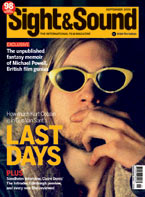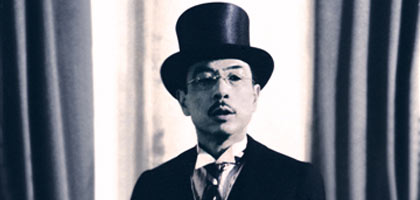Primary navigation


Aleksandr Sokurov's new film is an upbeat character study of Japanese emperor Hirohito. By Geoffrey Macnab
It's the summer of 1945 and the world is in upheaval. The Americans are preparing to drop nuclear bombs on Hiroshima and Nagasaki. They have already launched a night raid on Tokyo that killed more than 100,000 people and destroyed much of the city. As Japan burns, Emperor Hirohito potters around, writing poetry and studying marine biology. The Imperial Palace may have been destroyed but there are still peacocks in the garden and his lab remains intact. A slight, moustached man whose official name is 'Showa' (Enlightened Peace), he has a child-like innocence.
Hirohito can't stay cocooned forever. He is about to take an action that will shame him in the eyes of many Japanese yet will be seen as his most important legacy: he is going to set in motion the Japanese surrender. On 15 August he records a special message - "the war situation has developed, not necessarily to Japan's advantage..." - commanding the Japanese to stop fighting. Then, in late September, he is driven through the ruins of Tokyo to meet US army chief General Douglas MacArthur, the Supreme Commander of the Allied Powers in Japan and now the most powerful man in the country. Hirohito is terrified. He expects that his courtiers will do the talking for him and is startled when they are dismissed and he and his interpreter are left alone with MacArthur.
This strange encounter marks the pivotal moment of The Sun, the third part in Russian director Aleksandr Sokurov's 'Men of Power' tetralogy. After the gloom of Moloch (1999), about Hitler and Eva Braun, and the despairing, funereal tones of Taurus (2001), focused on the wheelchair-bound Lenin in his death throes, The Sun seems almost upbeat. This, after all, is a film about reconciliation. Against the odds, the US army chief and the Japanese emperor strike up a rapport. MacArthur decides that Hirohito should not be declared a war criminal. The emperor, for his part, renounces his divine status and gives his support to the American occupation.
There is a famous photograph of that first meeting between the two men. Both are shown in full frame, standing alongside one another, looking at the camera. MacArthur is in army fatigues, a stern expression on his face, his arms behind his back. He is far taller than Hirohito, who wears a slightly shabby morning suit - striped trousers, tail-coat, high collar - that makes him look like a dishevelled butler. The emperor's hands hang limply by his sides. He is smiling nervously and a little inanely.
There is still fierce debate about Hirohito's responsibility for Japanese war crimes. Some blame him directly for such atrocities as the 'Rape of Nanjing' in 1937, which resulted in the massacre of 300,000 Chinese prisoners of war, and the excesses of the Japanese army's biological-warfare arm Unit 731. Others claim he needlessly prolonged the war, fighting on throughout 1945. "For almost a year, in the face of gathering defeat, he urged his generals and admirals to gain one last victory in order to secure decent peace terms. During that period an additional 1.5 million Japanese were killed," Frank Gibney Sr noted in his Time magazine obituary of the emperor.
Hirohito is the bogeyman turned redemptive hero. As Edward Behr points out in the foreword to his revisionist 1989 study Hirohito: Behind the Myth, public perception of the emperor underwent an extraordinary transformation both at home and abroad. At the end of the war he was regarded in the west as one of "the three most hated men in the world", alongside Hitler and Mussolini. After his pact with MacArthur he went on to rule for another 44 years, dying after a 63-year reign in early 1989. By then he had become "a universally respected constitutional monarch, his pre-war and wartime past forgotten and certainly forgiven."
The issue of Hirohito's complicity in war crimes is hardly even broached by Sokurov. "This is not a documentary and not a political film," he says. "We all know what happened to Japan: Japan was very aggressive, invaded other countries and had to pay the price. What I was interested in was the art, the life and the people."
The Russian director spent ten years visiting Japan in preparation for the project. "Only gradually did I start to understand this character. I was attracted by this person as an individual and as a historical figure but I was also attracted by the fact that he existed in specific and very unusual surroundings. I suddenly saw the image of a person who is a humanist but is directly connected to war, murder, massacre and evil. So the situation was close to mythology."
As political history, The Sun may not stack up. But then the 'Men of Power' series itself is an inherently perverse project. These are movies about dictators whose actions have caused cataclysm, yet Sokurov addresses their lives in aesthetic and humanistic terms. "I don't make films about dictators," he has said, "but about people who are more outstanding than the rest. They appear to be in possession of ultimate power, but human frailty and passion affect their deeds more than their circumstances. Human qualities and character are stronger than any historical situation."
What The Sun does deliver is a closely focused character study, in which the film-maker turns his camera on his subject with the same relish that the emperor shows for examining his crustaceans, studying his mannerisms, gait and manner of talking in minute detail. In dragging a figure still regarded with reverence by the Japanese so close to the public gaze, Sokurov risked controversy - after all, many Japanese committed suicide when Hirohito renounced his god-like status and called for surrender. But when The Sun screened in Berlin in February the Japanese responded warmly. According to the film's UK sales agent The Works, Japanese distributors have already expressed interest and there has been talk of arranging special screenings for the Japanese royal family.
Sokurov is a more playful and adventurous film-maker than his reputation as a purveyor of gloomy Russian elegies might suggest. Stylistically The Sun has similarities with one of his earliest and most idiosyncratic ventures, A Painful Indifference (1982-87), an adaptation of George Bernard Shaw's Heartbreak House. That film mixed newsreel footage of Zeppelins, armies on the march, and of George Bernard Shaw stroking his beard, with stagy, naturalistic drama as a group of eccentrics run amok in a country house, oblivious to the devastation around them. In The Sun there is a similar mismatch between the scenes showing the emperor pursuing his domestic routine and those conveying the horror and destruction outside. "We see a country that is destroyed, people dying," says Sokurov, "yet we see him writing poetry, studying his national past, sticking to his everyday routine. To him nothing has changed. He continues to live the life he used to live."
Whatever the revisionist historians may say about Hirohito, Sokurov regards him as a holy innocent: a man who was neither articulate nor especially bright. "The Japanese, with sadness and irony, stressed that Hirohito couldn't even speak properly. This was partly to do with the fact that he didn't have to speak - people spoke in his name and he was isolated from real life." Yet at the crucial moment he was able to relate to MacArthur as a fellow human being. "This was what saved the emperor and his country. He was a person with whom one could negotiate," says Sokurov. Unlike Hitler or Lenin, Hirohito had no lust for power, no interest in ideology and didn't "kill anybody or step over anybody" in his bid to achieve high office. Issei Ogata plays him in appealing fashion, as a kind of Japanese Chance The Gardener, given to studying the natural world and with a disarming cheeriness.
Sokurov invariably looks to artists for his visual palette. On Mother and Son (1997) the point of reference was the German Romantic Caspar David Friedrich. For Father and Son (2003) he drew inspiration from Turner's watercolours. The Sun, which he shot himself, is designed, he says, to evoke the work of Rembrandt. The lighting, especially for the scenes showing Hirohito in his bunker, is rich and dark.
Sokurov's films don't usually boast action montages, but The Sun has a terrifying sequence showing the bombing of Tokyo. "The Americans bombed Tokyo exactly as they bombed Vietnam," says Sokurov. "There were no military installations in Tokyo so their aim was to burn the people." He describes 350 planes loaded with barrels of deadly gas that were hurled on the city. "People would burn like potatoes in a frying pan. It was impossible to run away or save yourself. Very few people survived. I was told by survivors that it wasn't possible to save yourself by jumping in the river because you continued cooking in the water. My aim was to create a mythological and symbolic image of this horrendous disaster."
In his public pronouncements Sokurov is often scathing about US culture, yet one of the strengths of The Sun is its nuanced portrait of MacArthur. For Sokurov, the US commander is almost as fascinating a figure as Hirohito himself. "MacArthur was two steps away from becoming president of the US, but he was too clever and too bright so they opted for Truman instead," says Sokurov. "A couple of years would pass and it would be MacArthur who would demand a nuclear bomb be thrown on the Soviet Union for participating in the Korean war. He was the author of the Japanese constitution, which is valid today, yet he was going to throw a bomb at the Soviet Union. That is an American paradox."
Like several other films detailing the relationships between the wartime Japanese and their enemies, The Sun develops into a buddy movie. The scenes between Hirohito and MacArthur (Robert Dawson) are as incongruous as those between Toshiro Mifune's Japanese soldier and Lee Marvin's GI, alone on a desert island fighting their private war in John Boorman's Hell in the Pacific (1968), or of David Bowie's sun-bleached British POW stirring up unholy passions in Ryuichi Sakamoto's Captain Yomoi in Nagisa Oshima's Merry Christmas Mr Lawrence (1982). At first each man is utterly baffled by the other, but gradually a mutual respect develops.
With its long takes, stately pacing and often sombre visuals, The Sun is likely to prove as daunting to mainstream western audiences as many of Sokurov's earlier films. Yet its references to cigarettes, Hershey bars and Charlie Chaplin, together with its surreal-seeming images of US soldiers alongside exotic birds in the imperial grounds, provide some comic moments. "The Japanese are great laughers," says Sokurov. "They're much more funny and merry than Europeans."
And Sokurov himself is promising to lighten up. He plans to round off the 'Men of Power' series with a film based on the Faust myth as interpreted by Goethe, Thomas Mann and others. "It will be a very colourful, elegant picture with a lot of Strauss music," he says. "There won't be any smell of war but you'll sense the aroma of chocolate in the room."